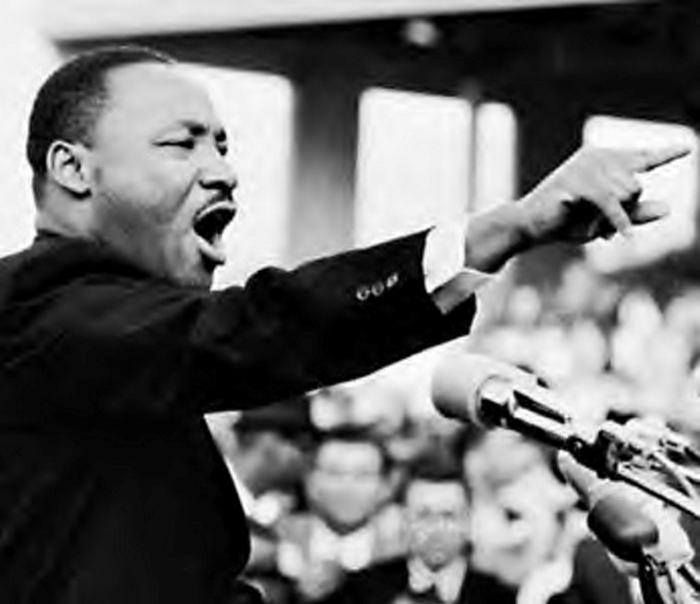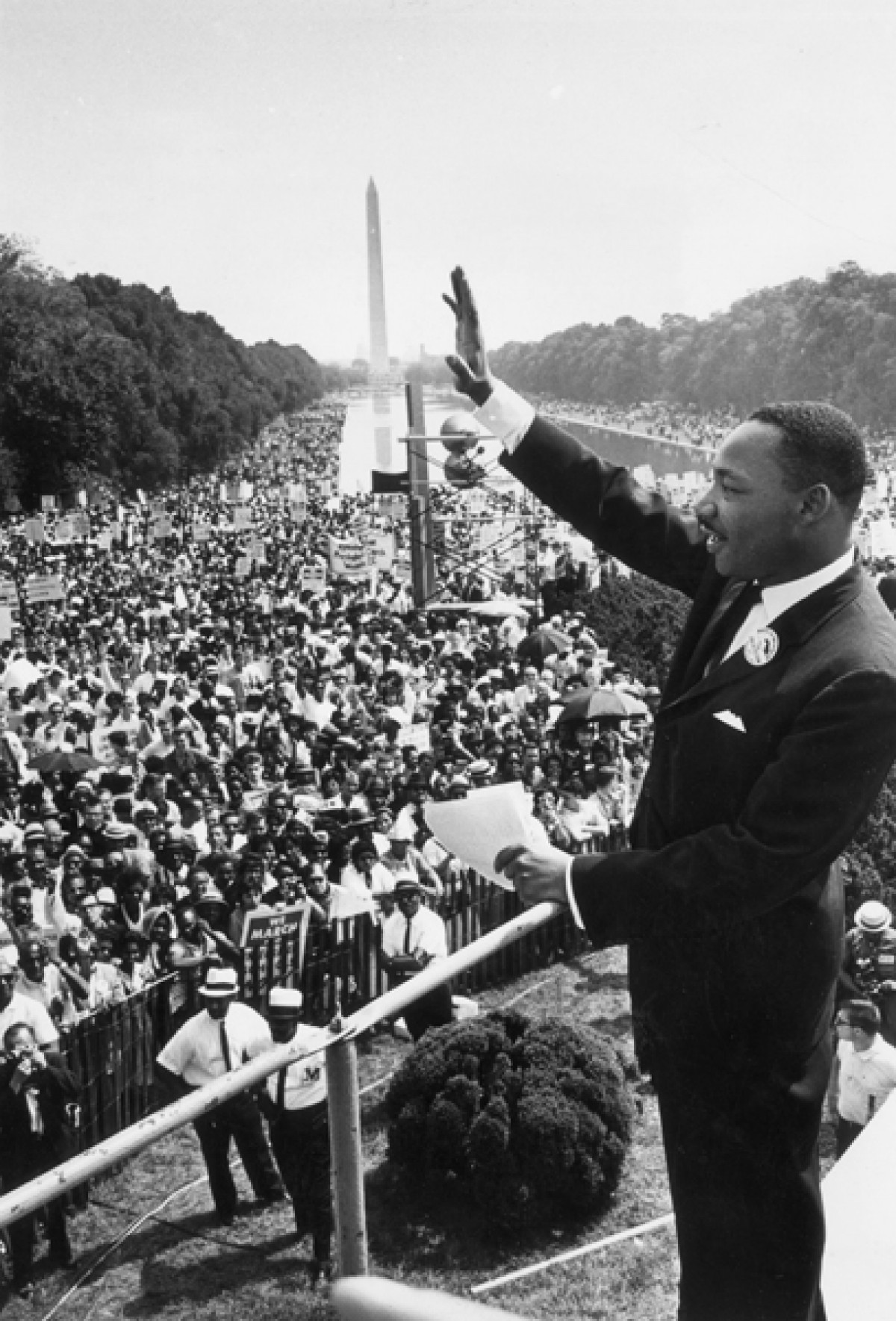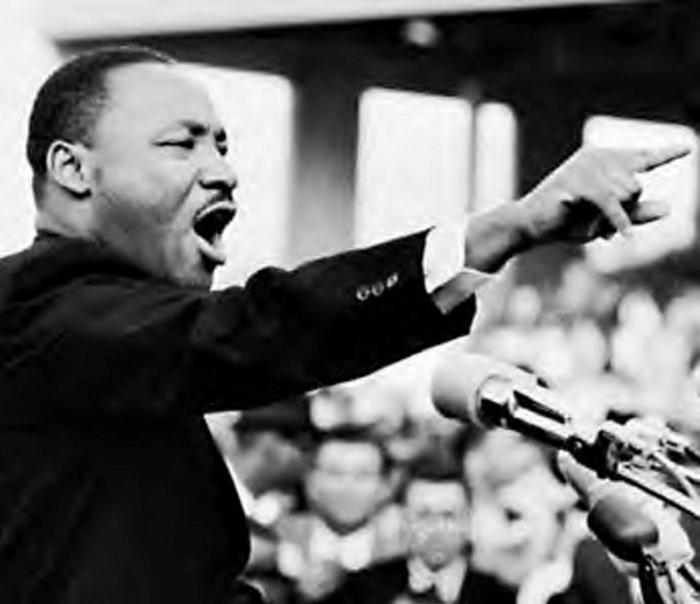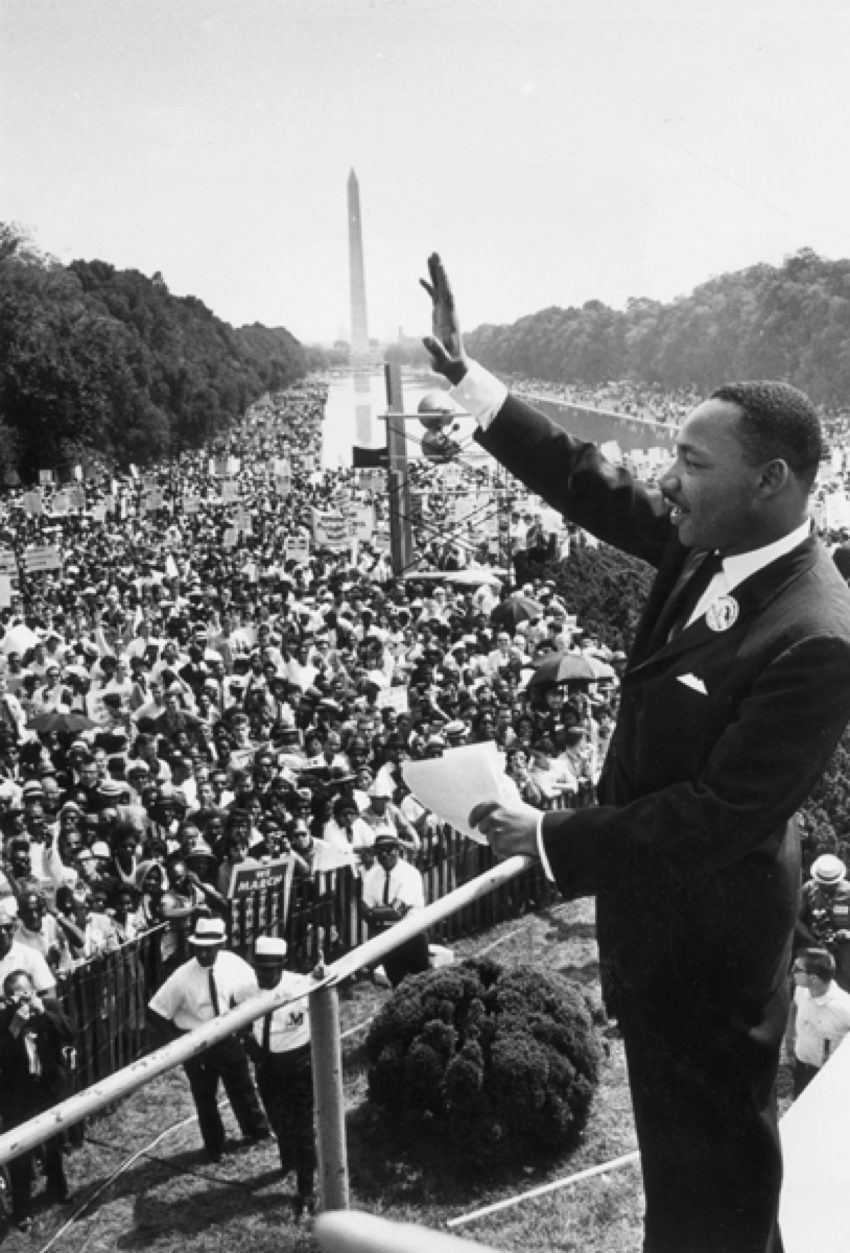Martin Luther King Jr. 4
MLK: The Resurrection
 MLK, Jr.: The Resurrection
MLK, Jr.: The Resurrection
By David Brooks
Translated and edited by Walter Lippmann for CubaNews

The Reverend Martin Luther King Jr., during the March on Washington for Work and Freedom, a major demonstration on August 28, 1963, where he delivered his historic I Have a Dream speech. Next Wednesday will be the 50th anniversary of his murder in Memphis,
English Article Goes Here
===
The Reverend Martin Luther King Jr. was killed 50 years ago (April 4) in Memphis, marking the bloodiest moment of what would be a 1968 that shook the United States and various parts of the world. Half a century later, this country is in the midst of a reactionary wave that has elevated a white supremacist backed by the Ku Klux Klan to the presidency, almost enough to make fun of King’s famous dream.
But it is worth remembering that King, when he was assassinated, was no longer just the man with a dream of racial equality, but a Nobel Prize winner and international moral authority who had dared in his later years to question and condemn his country’s economic and imperial system, including the war against Vietnam.
King went to Memphis, in the southern state of Tennessee, to support a union garbage workers strike in the name of economic and social justice. At the same time, he was organizing a national mobilization called the Poor People’s Campaign to demand economic rights for the underprivileged of all races and colors, a fundamental change in the U.S. capitalist system.
In the official rites and celebrations that King receives each year, it recalls his famous I Have a Dream speech, which he gave in 1963, but they almost never mention the radical message at the end of his life.
In 1967, King told a civil rights organization that the movement must address the issue of a restructuring of American society as a whole, adding that doing so meant coming to see that the problems of racism, economic exploitation, and war were all linked. These are interrelated evils. On the issue of economic injustice, he did not limit it to a racial issue: Let us be dissatisfied until the tragic walls that separate the outer city of wealth and comfort from the inner city of poverty and despair are destroyed by the battering rams of the forces of justice.
A few months earlier, he commented at a meeting of a civil rights organization: I think it is necessary to realize that we have moved from an era of civil rights to an era of human rights (…) we see that there has to be a radical redistribution of economic and political power…’.
Fifty years later, despite major changes in the country’s laws and regulations around institutional racism, crowned by the election of the first African-American president and what that means in a country founded on the backs of slaves, in essence, little seems to have changed.
An AP/NORC poll last week found that only one in 10 African Americans think the United States has met the goals of the civil rights movement half a century ago (35 percent of whites believe it has) after two rounds by an African-American president.
Fifty years later, new generations are continuing the fight against economic inequality, which has reached a record level in almost a century, with 1 percent of the richest families controlling nearly twice the wealth of 90 percent of the poor.
Fifty years later, incidents of official violence provoke fury. Impunity prevails as before, and indicators of segregation and racism multiply along with, and part of, the official anti-immigrant policies. Not to mention militarism in a country that has been in its longest wars in its history hoping to forget Vietnam.
But in the face of this, 50 years later, King’s echoes are heard all over the country.
Teachers in Oklahoma will begin a strike this Monday, following the triumphant example of their West Virginia peers, demanding not only a living wage and respect for their work – as they did 50 years ago in Memphis – but also greater investment in public education, especially to serve the poor and minorities; their counterparts in Kentucky (where teachers declared themselves sick by closing schools in 26 counties last Friday), Arizona and Wisconsin
African-American Rev. William Barber, famous for his Moral Mondays movement in North Carolina in 2013, which fought state initiatives to reduce spending on education and healthcare and to overturn some electoral rights, is resurrecting King’s Poor People’s Campaign this spring, and declaring, as his predecessor, that this is a moral issue.
MLK Dreamed of a Different America

Recalling the Memory of a Man Who Dreamed of a Different America 50 years ago.
Martin Luther King was honored in many places around the world today on the 50th anniversary of his murder.
Author: International Editor | internacionales@granma.cu
April 4, 2018 21:04:51
WASHINGTON: The life and work of Martin Luther King, a symbol of the struggle for civil rights in the United States, was remembered in the United States and much of the world today.
The murderous bullet that killed the renowned Baptist pastor in Memphis, Tennessee, on April 4, 1968, deprived humanity of one of its most tireless activists, who has since become an example to many of those who dream of a better world, reports Prensa Latina.
King dedicated his life to demanding an end to discrimination in the United States, where hundreds of years after the war of independence, blacks could not access certain places and had no right to vote.
He was also a harsh critic of the Vietnam War.
Despite the public notoriety he achieved, the activist was investigated and harassed by the FBI. In recent years, the real extent of the official political persecution of his movement, which included wiretaps of private calls and the spread of unfounded rumors, has come to light.
This Wednesday, personalities from around the world remembered his historic speech on the Lincoln Memorial esplanade in Washington, D.C., where he spoke the historic phrase “I have a dream.”
Half a century later, many of their demands remain unfulfilled in the United States, where discrimination and differences between blacks and whites continue to be a daily reality.
King’s granddaughter, Yolanda Renee, recently climbed on a platform to remember the Baptist pastor’s words when he asked that “his four little children be judged not by the color of their skin, but by the content of their character.
“I have a dream where we’ve had enough and where this world is one free of weapons. Period,” said the nine-year-old.
For his part, the president of Venezuela, Nicolás Maduro, recalled the legacy of the American social leader in a message published on Twitter.
“Martin Luther King was shot in the head in 1968 while greeting his followers in Memphis, Tennessee. Venezuelan young people must know their struggle and their dreams for us to make them a reality,” Maduro said.
Meanwhile, in Cuba, he was honored in a monument erected to his memory in the central park of 23 y F in the Vedado neighborhood.
The memorial event, organized by the Memorial Center that bears his name, opens a broader agenda of activities to be carried out this year related to the event.
Victor Fowler, director of the Centro Cultural Dulce María Loynaz, said Martin Luther King was an example of commitment and strength.
MLK: When a Dream Doesn’t Die

MLK, Jr.: When a Dream Doesn’t Die
Fifty years after the assassination of Martin Luther King Jr., the United States is still convulsed by racial inequality, but hope also remains.
 By Marylín Luis Grillo
By Marylín Luis Grillo
digital@juventudrebelde.cu
Posted: Wednesday 04 April 2018 | 09:35:06 PM
A CubaNews translation.
Edited by Walter Lippmann.
It was a single shot from a Remington-Peters rifle. Martin Luther King Jr. had fallen in Memphis, Tennessee.
Hours earlier, in a sermon, as if in anticipation of the bullet that tried to quell his throat, he had said to the congregation of the city: “We have difficult days ahead of us […] Like everyone else, I would like to have a long life. […] But that doesn’t worry me now. I just want to do God’s will. And he has allowed me to climb to the top of the mountain. And from there I saw the promised land. I may not get to her with you. But I want you to know tonight that we, as a people, will reach the Promised Land. And I’m happy about it. Nothing worries me.
Luther King, who at the age of 39 had won the Nobel Peace Prize, had led a non-violent struggle for the civil rights of the African-American community, which had become the banner of hope… King did not die, because dreams do not die, they only come true.
The results of their struggle are not yet complete. Fifty years after his murder, the United States is still convulsed by inequality. The latest statistics illustrate that African-Americans suffer three times as many expulsions and school dropouts, their average household income is half that of white families, and with only 13 percent of the population, El País reported, they account for 40 percent of drug arrests.
A study by the Inequality of Opportunity Project also concluded that racial income disparities are one of the most persistent issues in American society, and that the racial identity to which one belongs marks the opportunities for study, work, salary levels, and social advancement from generation to generation.
Black people are also three times more likely than whites to be victims of police in the United States, and in 2015 alone, for example, with Barack Obama in the White House, law enforcement officers killed more unarmed blacks than armed whites. Faced with an Afro-descendant, the trigger is pulled without much attention.
Police repression, increasing inequality, debates in society about the role of identity groups, and Trump’s racist rhetoric are some of the factors that have led to the resurgence of movements like the National Association for the Advancement of Colored People (NAACP) and the birth of others like Black Lives Matter.
“No Justice, No Peace” said one of the posters that flooded the streets of Sacramento a week ago protesting the death of another black man by police, 22-year-old Stephon Clark, who was shot down in the Californian capital on suspicion of breaking car windows and running around with a cell phone in his hand, which officers said they mistook for a gun.
Police opened fire up to 20 times on Clark and eight bullets hit him, seven from behind. The video of the arrest hardly shows whether the young man was approaching the officers or not. They do not order him to freez, or to lie on the ground, after the first order to show his hands, they immediately shout “gun” and shoot. The city has been shaken up again, but it is not enough.
This is a good time to remember Luther King. Less than two weeks ago, her nine-year-old granddaughter, Yolanda Renee, was repeating the mythical words “I have a dream. She called for “a world without weapons”. His father, Martin Luther King III, son of the pastor, announced Friday the launch of a global initiative to encourage young people to focus on non-violence to resolve their conflicts.
The struggle continues, but it must be carried to its end; “from the mountain of despair, a stone of hope,” Dr. King would say. He was the same one who never stopped spreading faith because he had died: no bullet can kill dreams.
Of the Dream and the Nightmare

Of the Dream and the Nightmare
Fifty years after Martin Luther King’s momentous visionary speech, African Americans continue to struggle to find the path to true equality.
 By Juana Carrasco Martin
By Juana Carrasco Martin
juana@juventudrebelde.cu
Published August 37, 2013 21:39:36 CDT
Updated: Thursday, September 21, 2017 | 10:25:08 PM
A CubaNews translation.
Edited by Walter Lippmann.

Martin Luther King greets the crowd at the Lincoln Memorial on August 28, 1963. Author: AP Published: 21/09/2017 | 05:38 pm
It was a blast, revalidating the struggle of many, raising the awareness of others and forming ranks in a social movement involving blacks and whites because it was for the civil rights of all. It also awakened those who were still lethargic after hundreds of years of outrage and submission.
On August 28, 1963, the 100th anniversary of the Emancipation Proclamation for black people in the United States, the end of slavery, was observed when a crowd, led by the Rev. Martin Luther King and other leaders of the black people’s struggle and social and labor movements, marched on Washington and gathered at the National Mall at the foot of the imposing statue of Abraham Lincoln.
“I have a dream,” he said in his speech to what he called the greatest demonstration of freedom in the history of the nation, and he called out with utter crudeness that a century later “we must face the tragic fact that the black man is not yet free. He was chained by segregation and discrimination, “living on a lonely island of poverty in the midst of a vast ocean of material prosperity,” he was “an exile in his own land.
The dream? that the words of the Constitution and the Declaration of Independence will apply to each and every American as a guarantee of the inalienable rights to life, liberty and the pursuit of happiness. These were denied to “citizens of color” who had been given a bounced check from a bankrupt justice. But this marginalized, humiliated, separated people, who were denied every opportunity, even the most basic, knew of their right to open the doors of justice, to cast aside racial injustice and to build “the solid rock of brotherhood.”
The time was urgent, warned Martin Luther King, and also alerted his people and the rest of the United States: “1963 is not the end, but the beginning” (…) “There will be no rest or tranquility in America until the black man establishes his citizens’ rights. The winds of revolt will continue to shake the foundations of our nation until the bright day of justice emerges.
Three national television networks, for the first time, covered the march for jobs and freedom in together. The message reached the entire nation that a melting pot was being said, the pot that had mixed all the peoples who had come to its shores and built a powerful country, but that was one of the great lies. The Black ingredient, even the original peoples, the “red skins”, had been taken out of society. That media coverage was proof that it was time for change.
There Joan Baez and Bob Dylan sang, as did the gospel performer, Mahalia Jackson, who carried the feeling of the crowd with I’ve Been ‘Buked and I’ve Been Scorned. Many spoke, including Joachim Prinz, president of the American Jewish Congress, recalling his years as a rabbi in Berlin under Hitler, who said – according to The Guardian – that his great people, who had created a great civilization, had then become a nation of silent spectators to hatred, brutality and mass crimes and cried out: “America cannot become a nation of spectators. America must not remain silent.”
On August 28, 1963, and Martin Luther King’s “I have a dream” speech, a door was opened. It was hardly mentioned in the 64,000 pages of debate and congressional hearings that gave way to the Civil Rights Act of 1964 or the Voting Rights Act of 1965, which put on paper what it should be and yet was not; but it was a touch of the target.
Enemies took it into account. Cointelpro, the program of espionage and infiltration into the social movements of the time, made him its target. William Sullivan, the FBI’s assistant director of domestic intelligence, recommended: “We must mark him now, if we have not done so before, as the most dangerous black man in the future of the nation.”
Hot summers came and their street uprisings, many more marches and actions, unity with the anti-war movement, and rejection of the Vietnam War, which they also used as their favorite cannon fodder for blacks and Latinos. Martin Luther King was in that fight for all.
Little by little there were achievements, even a middle class of “coloured” men and women emerged, their numbers increased in universities, they became professionals, their faces already appeared as leading figures in Hollywood films, they showed, even more, their value in the sports world, where the image of a black fist is vivid as a symbol of Black Power, the power of black people.
Blood flowed – that of Martin Luther King himself in April 1968, that of Malcolm X, that of George Jackson, that of many others – Mumia Abu Jamal is still in prison and those who chose more radical methods of struggle are being persecuted. Other leaders in an ongoing struggle were highlighted, as the Lincoln Memorial speaker said as the summer of 1963 ended: it was only the beginning…
And 50 years later, what?
Present at the rally at the National Mall on Saturday, August 24, 2013, which brought together no less than 100,000 Americans of all colors, generations and ideologies to commemorate the 50th anniversary of Martin Luther King’s oratory piece, were the parents of Trayvon Martin. He was the 17-year-old boy shot dead in the chest by a white vigilante in Florida on February 26, 2012. It took protest marches in many American cities and a lot of work to have the perpetrator arrested and put on trial, and almost now, in July, a jury of five white women and a Latina declared him “Innocent.” Not a few posters in front of Lincoln’s statue again called for justice for what is perceived as a hate crime.
Police in New York and other U.S. cities are accused of practicing stopping and frisking bystanders, most of whom are black or Latino, and preferably young, for no reason. They are stopped because of racial profiling. African-Americans make up seven times more than whites among the prison population, which is already the highest in the world. In the United States, it is known and recognized that they invest more in prisons than in schools….
Only 21 percent of their youth reach high school or college, compared to 37 percent of whites. Budget cuts in major cities declared bankrupt and in federal spending itself, that of the entire nation, affect the public school system and, of course, scholarships or university credits. It goes without saying that communities and neighborhoods where poor or low-income minorities live are among the hardest hit by teacher layoffs. During Barack Obama’s tenure alone, more than 300,000 school jobs have been lost – with a high proportion of these being African-American teachers and staff. Public education will be of even poorer quality, which means that there is no future sown there.
The unemployment rate in 2012 was 13.6 percent for the African-American work force, while the white unemployed made up 8.1 percent. Of the 45 million Americans who receive food aid because they are poor, more than 25 percent are black.
Barack Obama, the first black president of the United States will speak today, August 28, in honor of Martin Luther King. But it is well-known that the president is only an image in a House that is still white and protective of the interests of the powerful 1% against the 99% who – without distinction of race – have declared themselves in struggle and have also begun a path to close the gaps of class inequality, as the Occupy [Wall Street movement] which has been marginalized.
Now, in the southern states, even in other regions, electoral districts are being reconfigured and the black population is once again segregated from the vote, even having to pay to register. It also is the population with the lowest income, thereby discouraging voting. There is only one black senator among the top 100 in Congress, and 43 representatives in the House of Representatives, among 435…
Therefore, the validity of the thought of the civil and pacifist leader: “I have a dream: that one day this nation will rise up and live the true meaning of its creed. We hold this truth to be self-evident: All men are created equal.
Martin Luther King will continue: “Even though we face difficulties today and tomorrow, I still have a dream.”
Subscribe to Blog via Email
| M | T | W | T | F | S | S |
|---|---|---|---|---|---|---|
| 1 | 2 | 3 | 4 | 5 | 6 | 7 |
| 8 | 9 | 10 | 11 | 12 | 13 | 14 |
| 15 | 16 | 17 | 18 | 19 | 20 | 21 |
| 22 | 23 | 24 | 25 | 26 | 27 | 28 |
| 29 | 30 | 31 | ||||





You must be logged in to post a comment.